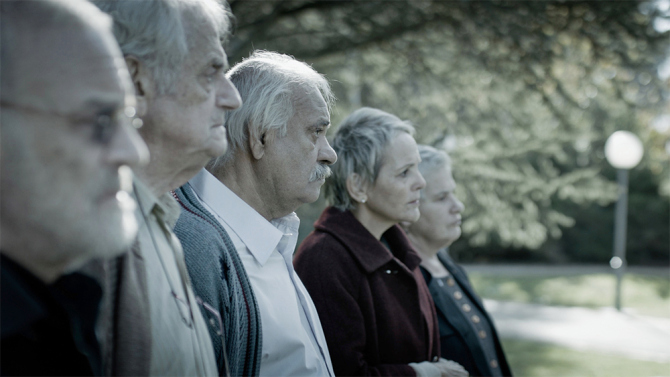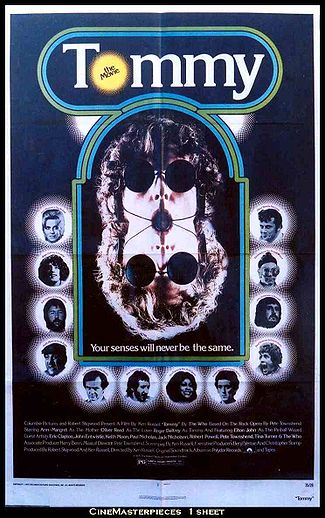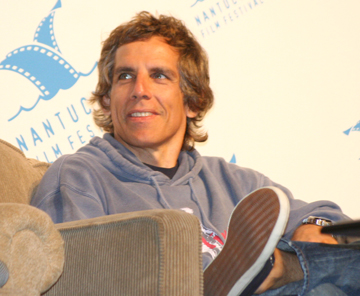|
|
||
|
Pro Tools
FILMFESTIVALS | 24/7 world wide coverageWelcome ! Enjoy the best of both worlds: Film & Festival News, exploring the best of the film festivals community. Launched in 1995, relentlessly connecting films to festivals, documenting and promoting festivals worldwide. Working on an upgrade soon. For collaboration, editorial contributions, or publicity, please send us an email here. User login |
"The Farewell Party" Enters Laughing
You've got to hand it to Sharon Maymon and Tal Granit. Any filmmakers willing to have a laugh with euthanasia should be lauded for their nerve, and in The Farewell Party, which they jointly wrote and directed, the case is made for the right to jest with dignity. Still, there is much in the film that will gall opponents of mercy killing. The casting of iconic comedians offers a powerful assist in delivering bleak themes, especially for devotees of Israeli entertainment who read the marquee as permission to guffaw. Yet for all its drollery, Farewell is in essence a fable. So the fun is infused with moral boosters. As a meditation on assisted suicide, it poses the question: Should we help people with terminal conditions end their life, or leave them to suffer or lose mental function until their time eventually comes? A saving grace of this issue film is that it never feels didactic. It's far too warm-blooded to clunk any heads. At least not while emotional matters like friendship and separation are there to explore. Why make a public service ad when you can get viewers to vicariously part from someone they love, or even from their own selves -- and absorb the knocks of that drama? The film's Hebrew title, A Good Death, suggests the soul searching mode the audience is meant to dial on already before the opening scene. Farewell unfolds in a Jerusalem retirement home where the days are literally numbered. Retired electrical engineer Yehezkel (legendary comedian Ze'ev Revach) passes his time tinkering with inventions when he's not doting on his wife Levana (Levana Finkelstein) or comforting sick residents in the amped voice of God. Pained by the sight of his best friend Max (Shmuel Wolf) being ravaged by a terminal illness, Yehezkel devises a gadget to help him end his suffering and outfox the doctors who are pledged to prolong his life. The beauty of Yehezkel's rig is that the sufferer chooses when to check out at the press of a button, clearing others of potential charges of murder. Max's wife Yana (Aliza Rozen) supports her dear husband's wish to extinguish his agony. The hospital, however, does not. Undeterred, Yehezkel and Yana seek out the assistance of retired veterinarian Dr. Daniel (Ilan Dar) and his married lover, Raffi (Rafael Tabor), a former police detective who tidies the tracks. What starts as an act of compassion turns into a cottage industry. When word gets out of the machine, commissions start bounding in. First in line is the desperate Dubek (Yosef Karmon), who implores the enterprising team to spare his dying wife further excruciation. Meanwhile, Yehezkel's own wife grows increasingly averse to what she views as murderous acts. To complicate matters, she herself starts to succumb to Alzheimers, bringing both her and Yehezkel to rethink their respective views on the newfangled gizmo.
What are we to make of the names of our exterminating angels? With "Yehezkel" aka "Ezekiel," "Daniel" and "Raffi" aka "Rafael" -- that's two prophets and an arcangel in the mix -- it's tempting to conclude that they're in Jerusalem doing God's work. In the film, Yehezkel is accused of thinking he's an "übermensche." And that's essentially the idea, as Maymon and Granit confirmed in our recent chat. "In the first scene we see Yehezkel play God, but he thinks he's God throughout the film," said Maymon, adding, "He's the one who decides who will die and when." Granit went in for the punch line: "And you know what happens to someone who plays God? There is a price to pay." Whether to suggest threshholds or judgements or both, Yekezkel and his fellow goldens come under cinematographer Tobias Hochstein's gauzy white light, the interior shots of which emanate from a studio. Edward Hopper himself might have touched up the lightfall from the windows. The elegiac, storybook effect transports viewers to the other side of reality where tough topics can be processed at a more palatable remove. It's not until the last scene that the visuals take on a documentary quality, reflecting the grounded tones of the film's climactic heart to heart. The idea for FarewelI is itself rooted in a true story. It happened on the day when the grandmother of Maymon's ex-boyfriend died, four years into her bout with cancer. "We felt how death relieved her from pain and suffering," recalled Maymon. "Then the paramedics came and tried to resuscitate her, like they were saving her -- but it was the opposite." For Maymon, the experience was "absurd and very surreal." He and Granit mounted a different sort of resurrection for their mythic saga: they tapped Akira Kirosawa's Seven Samurai in following a hero who recruits helpmates to achieve a mission. Other filmmakers whose sensibilities rear up include tragicomic stalwarts Aki Kaurismäki and Roy Andersson. Yet the bonds that make up The Farewell Party show off its homegrown pedigree stretching back to such collective coming of agers as Renen Schorr's Late Summer Blues or Avi Nesher's The Troupe and Disengoff 99. Before the whir of globalization, what Israelis chiefly had was one another, pitted against their Middle Eastern fate. Now, decades later, Farewell's retirees once again have time for their buddies, but here the existential threat is their own mortal flesh. Rolling from one group adventure to the next, they could be building the nation all over again were they not so busy prepping for the next frontier. About that transition, let's digress for a moment and consider the film's deadpan musical number, Land of Lahadam. Warbled by both the bed-ridden and the ambulatory, the song drums up a reckoning. Just the title alone of Naomi Shemer's classic suggests there's mischief afield. "Lahadam" is a Hebrew anagram for "what never was," whose murky translation as "Neverland" doesn't quite do justice to the implied yearning for a land of milk and honey versus the social, political and ethical woes that have marked Israeli reality. The fact that corrupt cop Raffi worships at the altar of Mammon may not have been intended as commentary about today's capitalist Israel, but as the film's rare piece of cartoonish villainy, it does the trick just the same. He isn't even straight about his homosexuality, and, in one of the film's funnier sight gags, he's litterally outed, butt-naked, in a closet. If the biblically heralded dream has proved elusive in this world, what manner of disillusionment awaits our geriatrics in eternal Zion? The "path" there may be "unknown," per Shemer's lyrics, but after building a Jerusalem that in some sense went astray, they could be forgiven for desiring a say in their ascent to the next world. Along the way, the characters embody different facets of the right-to-die debate and of what moves them. Maymon and Granit strike a deft balance between the heady and the visceral, the melodramatic and the humorous. They've had practice. The duo's previous collaborations include the short film Summer Vacation and the prize-winning TV drama Mortgage; and Maymon teamed up with Erez Tadmor to make the hit comedy A Matter of Size, which is currently getting its Hollywood remake. Could Farewell meet a similar end? Perhaps, though the humor may be too black for some tastes and would likely come in for a blanching. To preserve the tech in-joke, it could be set in Silicon Valley. It may not carry the same punch as Farewell's Israel -- the startup nation where every moment brings a new patent -- but just as Yehezkel and his team are the hot new spark there, a stateside version can also milk kicks from the idea that today's innovation comes from senior citizens, about an unknown tomorrow. Regardless of where the story may reincarnate next, The Farewell Party's exploration of life-changing decisions will play out on a broader stage. The fact that 26 states are poised to grant terminally ill Americans the right to die makes this Israeli import a zeitgeisty prospect. Its generous doses of wisdom and humanity, however, give it a shot at immortality.
20.05.2015 | Laura Blum's blog Cat. : Aliza Rozen assisted death euthanasia comedy Ilan Dar Ilana Finkelstein mercy killing Mita Tova Rafael Tabor Sharon Maymon Shmuel Wolf Tal Granit The Farewell Party Yosef Karmon Ze'ev Revach Independent
|
LinksThe Bulletin Board > The Bulletin Board Blog Following News Interview with EFM (Berlin) Director
Interview with IFTA Chairman (AFM)
Interview with Cannes Marche du Film Director
Filmfestivals.com dailies live coverage from > Live from India
Useful links for the indies: > Big files transfer
+ SUBSCRIBE to the weekly Newsletter Deals+ Special offers and discounts from filmfestivals.com Selected fun offers
> Bonus Casino
User imagesAbout Laura BlumThe EditorUser contributions |































